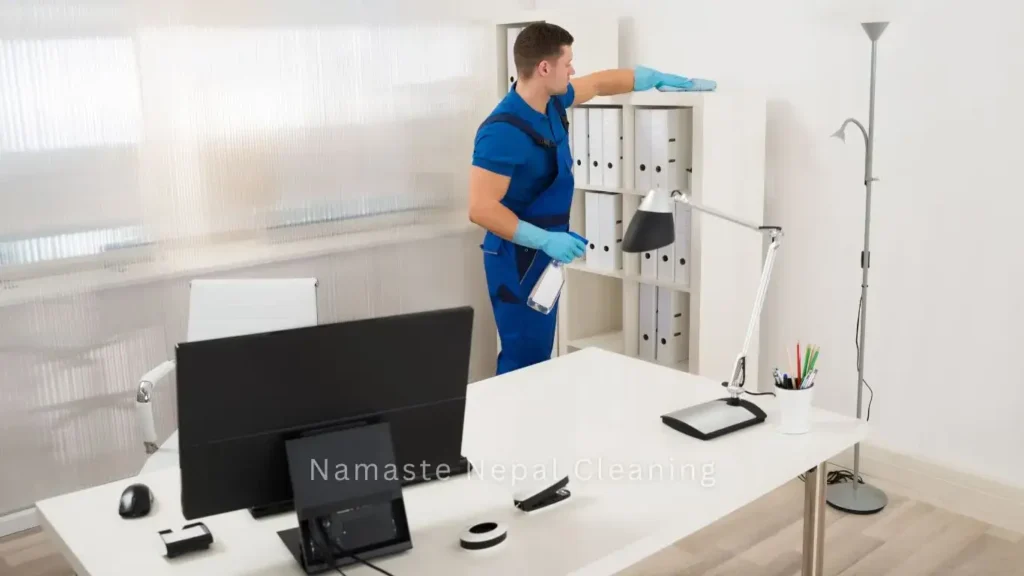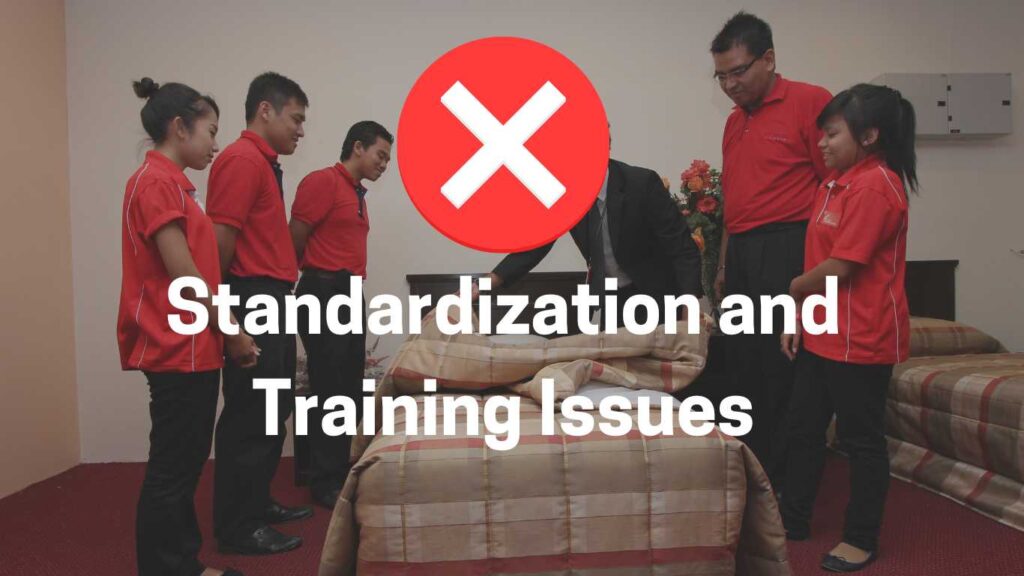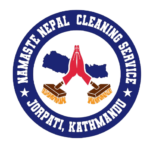Table of Contents
I. Introduction
A. Definition & Scope
Housekeeping in a corporate setting goes far beyond basic cleaning. It includes routine maintenance, facility management, and overall care of the workspace. In simple terms, it means ensuring that offices, common areas, restrooms, and other workspaces are kept clean, safe, and functional. This comprehensive approach not only supports day-to-day operations but also contributes to a healthier and more productive environment.

B. Significance of ROI
Measuring the ROI of corporate housekeeping in Nepal is crucial for businesses. When companies invest in effective housekeeping, they can expect benefits like increased employee productivity, lower health-related costs, and a stronger corporate image. A clear return on investment shows that spending on cleaning and maintenance isn’t just an expense—it’s a strategic investment that can lead to long-term savings and improved overall performance.
C. The Nepal Context
Nepal’s corporate sector is rapidly evolving, and local businesses are beginning to recognize the value of top-notch facility management. With unique challenges such as infrastructure constraints and diverse local expectations, Nepali companies are increasingly interested in a housekeeping cost-benefit analysis in Nepal corporates. This focus helps ensure that their investment in corporate cleaning and maintenance not only meets local standards but also drives significant business value.
D. Highlighting Industry Leaders
Innovative companies in Nepal are setting benchmarks in effective facility management. For instance, industry leaders like Namaste Nepal Cleaning Service have demonstrated how a strategic focus on corporate housekeeping can result in measurable returns. Their success stories serve as a corporate cleaning ROI Nepal case study for others, showcasing the benefits of investing in a clean, well-maintained workspace.
II. The Corporate Housekeeping Landscape
A. Global Trends in Corporate Housekeeping

Across the globe, corporate housekeeping is evolving with a strong emphasis on efficiency, technology, and sustainability. Many companies are now using advanced cleaning technologies such as automation, IoT devices, and smart cleaning systems to improve their operations. These innovations not only reduce labor costs but also enhance the overall ROI of corporate housekeeping. Businesses worldwide are embracing eco-friendly cleaning agents and sustainable practices, which also help boost their corporate image and appeal to environmentally conscious consumers.
B. The Role of Cleanliness in Business Performance
A clean and well-maintained work environment plays a crucial role in overall business performance. Studies have shown that a clean workspace contributes to higher employee productivity and lower absenteeism, which in turn benefits the bottom line. Healthier employees mean fewer sick days, and a clean environment significantly boosts employee morale and confidence. This improvement in productivity and health directly supports a strong ROI of corporate housekeeping in Nepal, making it clear that investing in cleanliness is not just about appearance—it’s a strategic move for business growth.
C. Regulatory and Health Standards
Internationally, there are established regulatory and health standards that guide corporate housekeeping practices. These standards ensure that workplaces maintain high levels of cleanliness and safety, protecting both employees and visitors. However, companies in Nepal often need to adapt these international guidelines to fit local conditions. For example, while global best practices emphasize automation and high-tech solutions, Nepali firms might need to balance these recommendations with available local resources and infrastructure. Adapting these standards effectively can lead to significant improvements in the housekeeping cost-benefit analysis in Nepalese corporations, helping businesses achieve measurable returns on their investments.
D. Nepal-Specific Dynamics
In Nepal, the corporate housekeeping landscape is influenced by unique local factors. Infrastructure challenges, such as inconsistent access to advanced cleaning technology, require businesses to adopt more tailored approaches. Additionally, cultural perceptions about cleanliness and maintenance can differ from international norms, which means strategies must be adapted to meet local expectations. Evolving regulatory frameworks in Nepal also mean that companies have to continuously update their practices to remain compliant. By focusing on return on investment for facility management in Nepali companies, businesses can better address these local dynamics and implement solutions that effectively balance cost with performance.
III. Understanding the ROI of Housekeeping
A. Defining ROI in the Context of Housekeeping
ROI, or return on investment, measures how much benefit a company gains relative to its spending. In corporate housekeeping, ROI isn’t just about immediate financial gains—it also includes qualitative benefits such as improved employee well-being and enhanced brand image. When we talk about the ROI of corporate housekeeping in Nepal, we consider not only cost savings but also improvements in productivity and workplace safety that result from a clean, well-maintained environment.
B. Measuring Impact
Measuring the impact of housekeeping involves tracking key performance indicators (KPIs). These include:
- Reduced Absenteeism: A clean and healthy workspace helps reduce sick days, leading to higher overall productivity.
- Increased Employee Satisfaction: When employees work in a well-kept environment, their morale and engagement improve.
- Enhanced Corporate Image: A pristine workplace reflects positively on the company’s brand, attracting both customers and top talent.
Using these KPIs, companies can better understand and quantify the corporate cleaning ROI Nepal case study outcomes, illustrating how effective housekeeping directly benefits overall business performance.
C. Cost-Benefit Analysis Methods
Conducting a thorough cost-benefit analysis helps companies identify both the direct and indirect benefits of their housekeeping investments. Frameworks used in this analysis might include:
- Direct Costs vs. Direct Savings: Comparing the expenses of cleaning services against immediate savings from fewer repair and maintenance issues.
- Indirect Benefits: Factoring in reduced healthcare costs, fewer sick leaves, and improved employee productivity. These methods are essential for a robust housekeeping cost-benefit analysis in Nepal corporates, ensuring that every dollar spent on housekeeping translates into measurable benefits for the organization.
D. Comparative Analysis
Finally, comparing the ROI of housekeeping to other corporate expenditures highlights its strategic value. While expenses on areas like marketing or technology are often highlighted, investing in cleaning and facility management can yield substantial long-term returns. For example, the return on investment for facility management in Nepali companies can be significantly higher when factoring in long-term health and productivity benefits. In many cases, a well-planned housekeeping strategy not only protects company assets but also boosts overall business performance, proving that cleanliness is indeed a smart, strategic investment.
IV. Benefits of Effective Housekeeping
A. Operational Benefits
Effective housekeeping creates a clean and organized work environment, which leads to higher employee productivity. When offices are well maintained, employees face fewer distractions and can work more efficiently. A tidy workspace not only boosts morale but also helps reduce errors and downtime, contributing to the overall ROI of corporate housekeeping in Nepal.
B. Financial Benefits
Investing in corporate housekeeping can result in significant long-term cost savings. Regular cleaning and preventive maintenance help avoid costly repairs and reduce health-related expenses, such as medical bills from work-related illnesses. This proactive approach is a key element of a robust housekeeping cost-benefit analysis in Nepal corporates, demonstrating that spending on cleanliness today can prevent larger expenses in the future.
C. Brand & Image Enhancement
A clean work environment directly reinforces a company’s reputation. When a business maintains high standards of housekeeping, it projects an image of professionalism and care, which builds trust with clients, partners, and employees alike. In essence, a well-kept office can serve as a corporate cleaning ROI Nepal case study in itself, reflecting positively on the brand and enhancing customer confidence.
D. Sustainability and CSR
Eco-friendly cleaning practices are becoming an important part of corporate social responsibility (CSR). By integrating sustainable methods and environmentally friendly products, companies not only contribute to a healthier planet but also enjoy a positive return on investment. Embracing green practices can be a strong differentiator, making the ROI of corporate housekeeping in Nepal even more compelling by aligning operational efficiency with sustainable values.
E. Nepal-Focused Examples
In Nepal, local challenges such as seasonal variations and infrastructure constraints require tailored housekeeping strategies. Effective housekeeping practices can address these challenges by ensuring that facilities remain clean and operational regardless of local conditions. For example, proactive maintenance during the rainy season can prevent water damage, and regular cleaning can manage dust and other pollutants common in urban areas. These strategies help Nepali businesses maintain a high ROI of corporate housekeeping in Nepal by mitigating risks associated with local environmental factors.
F. Company Spotlight
Innovative companies, like Namaste Nepal Cleaning Service, are leading the way by implementing advanced housekeeping practices that boost operational efficiency and corporate reputation. By focusing on both the qualitative and quantitative benefits of a clean workspace, these industry leaders provide clear evidence of how investing in corporate housekeeping for Nepalese businesses results in measurable financial returns and enhanced workplace performance.
V. Challenges in Implementing Effective Housekeeping
A. Budgetary Constraints

One of the biggest challenges in implementing corporate housekeeping in Nepal is the allocation of financial resources. Many businesses, especially small and medium enterprises (SMEs), view housekeeping as an additional expense rather than an investment. However, a well-planned housekeeping cost-benefit analysis in Nepal corporates can demonstrate that preventive maintenance and cleanliness lead to long-term savings by reducing equipment deterioration, minimizing health-related absences, and maintaining a professional work environment.
B. Cultural and Organizational Resistance
In many traditional Nepali businesses, cleanliness is often overlooked or seen as a secondary priority. Changing this mindset requires strong leadership and awareness programs that highlight the ROI of corporate housekeeping in Nepal. Companies that educate employees on the benefits of cleanliness, including increased productivity and improved workplace well-being, can create a culture that values and prioritizes housekeeping as an essential business function.
C. Standardization and Training Issues

A major challenge in the Nepali corporate sector is the lack of standardized housekeeping practices and a skilled workforce. Many businesses rely on informal cleaning staff without proper training, leading to inconsistent quality and inefficiencies. Investing in structured training programs tailored to the local context can significantly improve corporate cleaning standards. By ensuring employees follow best practices, businesses can enhance the corporate cleaning ROI Nepal case study outcomes and establish long-term operational efficiencies.
D. Infrastructure and Supply Chain Issues in Nepal
Nepal’s infrastructure and supply chain limitations present unique challenges for corporate housekeeping. Many cleaning supplies and equipment must be imported, leading to higher costs and occasional shortages. Additionally, waste management systems in some areas are underdeveloped, making it difficult for companies to implement sustainable cleaning practices. To overcome these hurdles, businesses should explore local sourcing options, invest in reusable and eco-friendly materials, and collaborate with service providers like Namaste Nepal Cleaning Services & Suppliers Pvt. Ltd. to ensure consistent and cost-effective solutions.
VI. Strategies for Maximizing Housekeeping ROI
A. Best Practices in Housekeeping Management
To maximize the ROI of corporate housekeeping in Nepal, businesses must implement structured housekeeping protocols. Best practices include:
- Establishing Standard Operating Procedures (SOPs): Clear guidelines ensure consistent cleaning quality.
- Regular Audits & Inspections: Conducting routine checks helps maintain hygiene standards and identify areas needing improvement.
- Quality Control Measures: Using KPIs such as cleanliness ratings and employee feedback ensures that housekeeping contributes positively to productivity and corporate reputation.
B. Leveraging Technology & Innovation
Advancements in cleaning technology can significantly improve efficiency and cost-effectiveness. Key innovations include:
- Automation & Smart Cleaning Solutions: Robotic vacuum cleaners, sensor-based monitoring, and automated dispensers reduce labor costs while ensuring optimal cleanliness.
- Internet of Things (IoT) in Facility Management: Smart sensors can track air quality, detect spills, and automate cleaning schedules, minimizing wastage and maximizing corporate cleaning ROI Nepal case study outcomes.
- Eco-Friendly Cleaning Solutions: Sustainable and biodegradable products not only reduce environmental impact but also align with CSR goals.
C. Employee Engagement & Training Programs
A well-trained housekeeping team plays a crucial role in achieving high cleanliness standards. Effective training programs should focus on:
- Technical Skills & Safety Protocols: Teaching staff how to use equipment, handle cleaning agents safely, and follow industry standards.
- Employee Motivation & Recognition: Encouraging a culture where cleanliness is valued through incentives and recognition programs.
- Workplace Hygiene Awareness: Engaging all employees, not just cleaning staff, to maintain a clean and organized work environment.
D. Outsourcing vs. In-House Management
Businesses in Nepal must decide between managing housekeeping in-house or outsourcing to professionals like Namaste Nepal Cleaning Services & Suppliers Pvt. Ltd.
- Outsourcing Advantages:
- Access to trained professionals and specialized equipment.
- Cost-effective compared to maintaining a full-time in-house team.
- Compliance with regulatory and industry cleaning standards.
- In-House Cleaning Benefits:
- Greater control over staff and cleaning schedules.
- Customizable cleaning approaches aligned with company culture.
- Decision-Making Framework: Businesses should compare costs, efficiency, and flexibility to determine which model best suits their needs.
E. Custom Strategies for Nepali Corporations
Nepali businesses must tailor global best practices to fit local market conditions, infrastructure challenges, and cultural expectations. Successful approaches include:
- Adapting Seasonal Cleaning Strategies: Adjusting cleaning frequency based on seasonal dust, monsoon-related issues, and festival preparations.
- Prioritizing High-Traffic Areas: Focusing on lobby spaces, meeting rooms, and shared facilities to maintain brand image and hygiene.
- Partnering with Local Cleaning Experts: Industry leaders like Namaste Nepal Cleaning Services & Suppliers Pvt. Ltd. offer customized solutions that align with Nepali corporate needs.
By adopting these strategies, businesses can ensure that their investment in housekeeping yields maximum financial and operational benefits, reinforcing the return on investment for facility management in Nepali companies.
VII. Case Studies and Success Stories
A. Global Success Models
Many multinational corporations recognize housekeeping as a crucial investment that directly impacts business performance. Some notable examples include:
- Google & Workplace Hygiene: Google’s offices prioritize high cleanliness standards, incorporating automation and sustainability practices to enhance employee well-being and productivity.
- Marriott Hotels & Cleaning Efficiency: The global hotel chain has optimized its housekeeping operations using real-time tracking and automation, reducing costs while maintaining five-star cleanliness.
- Toyota’s Lean Housekeeping Approach: Toyota integrates facility cleanliness into its famous “5S” methodology (Sort, Set in Order, Shine, Standardize, Sustain), ensuring a productive and organized work environment.
These cases demonstrate how corporate cleaning ROI can be maximized through structured management, technology, and strategic investment.
B. Nepali Corporate Case Studies
In Nepal, businesses are increasingly realizing the importance of professional housekeeping. Some emerging examples include:
- Large Commercial Banks: Leading financial institutions in Nepal have started investing in facility management services to maintain a professional and hygienic environment for employees and clients, leading to increased customer trust.
- Hotels & Hospitality Sector: Many five-star hotels in Nepal, such as those in the tourist hubs of Kathmandu and Pokhara, have integrated strict housekeeping protocols to boost guest satisfaction and repeat business.
- Corporate Offices & Co-Working Spaces: A growing number of modern office spaces have implemented structured cleaning schedules, resulting in improved employee morale and reduced health-related absenteeism.
Where detailed real-world data is limited, a housekeeping cost-benefit analysis in Nepal corporates can provide hypothetical models to illustrate potential ROI gains.
C. Spotlight on Namaste Nepal Cleaning Services & Suppliers Pvt. Ltd.
As an industry leader, Namaste Nepal Cleaning Services & Suppliers Pvt. Ltd. has helped numerous corporate clients optimize their facility management strategies. Key achievements include:
- Customized Corporate Housekeeping Solutions: Tailored cleaning services that address specific needs, such as deep cleaning for high-traffic office spaces.
- Eco-Friendly Cleaning Practices: The company has introduced sustainable solutions, reducing chemical waste while maintaining superior hygiene standards.
- Data-Driven Approach: By tracking cleaning schedules, client satisfaction, and operational efficiency, the company continuously improves its service quality, reinforcing the return on investment for facility management in Nepali companies.
D. Lessons Learned
Key takeaways for businesses looking to improve housekeeping ROI include:
- Strategic Investment Yields Long-Term Benefits: Allocating budgets for facility management leads to increased efficiency and cost savings over time.
- Employee Engagement is Essential: Encouraging employees to maintain cleanliness can enhance overall workplace hygiene.
- Technology Enhances Productivity: Businesses that integrate automation and data tracking can optimize cleaning schedules and reduce operational costs.
- Outsourcing Can Provide Higher ROI: Partnering with experienced service providers like Namaste Nepal Cleaning Services & Suppliers Pvt. Ltd. can ensure higher cleaning standards with professional expertise.
By learning from both global and local examples, Nepali businesses can implement effective housekeeping strategies that lead to tangible financial and operational benefits.
VIII. Future Trends in Corporate Housekeeping
A. Technological Advancements
Corporate housekeeping is evolving rapidly, with emerging innovations reshaping facility management. Some key advancements include:
- Robotic Cleaning Solutions: AI-powered vacuum cleaners and automated mopping systems are being integrated into corporate spaces worldwide, reducing manual labor costs and improving efficiency.
- IoT & Smart Monitoring: Sensor-based technology can track cleanliness levels, optimize cleaning schedules, and ensure hygiene standards are met in real-time.
- Data Analytics for Housekeeping Management: Companies can use analytics to measure housekeeping ROI in Nepal, tracking costs, efficiency, and overall impact on employee well-being.
B. Sustainability and Green Initiatives
The shift towards eco-friendly corporate cleaning solutions in Nepal is gaining momentum. Sustainable practices include:
- Use of Green Cleaning Products: Non-toxic, biodegradable cleaning agents are replacing chemical-based solutions.
- Water & Energy-Efficient Cleaning Equipment: Modern equipment consumes less water and electricity, reducing operational costs and environmental impact.
- Waste Management & Recycling Programs: Offices are implementing better waste segregation and recycling initiatives, aligning with corporate social responsibility (CSR) efforts.
C. Evolving Corporate Norms
Corporate expectations regarding facility management trends in Nepal’s corporate sector are changing. Key anticipated shifts include:
- Stricter Health & Safety Regulations: Future government policies may enforce higher hygiene standards for corporate offices, especially post-pandemic.
- Hybrid Workspaces & Housekeeping Needs: As remote and flexible working arrangements grow, cleaning schedules and protocols must adapt.
- Increased Outsourcing Demand: Businesses are likely to rely more on outsourced corporate housekeeping services to maintain hygiene standards without adding in-house staff.
D. Preparing for the Future
To stay ahead, Nepali businesses must adopt proactive strategies. Key recommendations include:
- Invest in Smart Cleaning Solutions: Using automation and AI-driven housekeeping can enhance efficiency.
- Prioritize Green Cleaning Practices: Sustainable cleaning reduces environmental impact and improves brand reputation.
- Adopt Data-Driven Cleaning Management: Businesses should track and analyze housekeeping KPIs to optimize resources and enhance corporate cleaning ROI in Nepal.
- Collaborate with Industry Leaders: Partnering with expert cleaning providers like Namaste Nepal Cleaning Services & Suppliers Pvt. Ltd. ensures access to the latest innovations and best practices.
By embracing these trends, companies can enhance operational efficiency, employee satisfaction, and long-term cost savings, reinforcing the critical role of corporate housekeeping ROI in Nepal’s business landscape.
IX. Conclusion
A. Recap of Key Points
The ROI of corporate housekeeping in Nepal extends far beyond maintaining a clean office space. Throughout this discussion, we have highlighted:
- How cleaning and facility management directly impact employee productivity, health, and corporate image.
- The financial benefits, including long-term cost savings from preventive maintenance and reduced absenteeism.
- Challenges such as budget constraints, cultural barriers, and infrastructure limitations in Nepal.
- Effective strategies to maximize housekeeping ROI, including technology adoption, staff training, and outsourcing.
- Future trends such as automation, eco-friendly practices, and stricter hygiene regulations that will shape corporate housekeeping.
B. Strategic Recommendations
To maximize the ROI of corporate housekeeping in Nepal, businesses should consider the following:
- Adopt Data-Driven Cleaning Management: Track cleaning efficiency, employee satisfaction, and financial savings to measure impact.
- Invest in Sustainable Practices: Using eco-friendly corporate cleaning solutions in Nepal enhances CSR and long-term savings.
- Leverage Outsourced Expertise: Partnering with Namaste Nepal Cleaning Services & Suppliers Pvt. Ltd. ensures access to professional, well-trained cleaning teams.
- Integrate Technology: Smart cleaning devices, IoT monitoring, and automated systems improve efficiency and reduce costs.
- Customize Housekeeping Strategies for Nepal: Tailor international best practices to fit local corporate challenges, climate conditions, and infrastructure limitations.
C. Final Thoughts
Housekeeping is no longer just an operational necessity—it’s a strategic investment that impacts workplace efficiency, employee well-being, and corporate reputation. By prioritizing corporate cleaning ROI in Nepal, businesses can create healthier, more productive workspaces while optimizing costs and strengthening their brand image.
Forward-thinking companies like Namaste Nepal Cleaning Services & Suppliers Pvt. Ltd. are leading the way in setting new standards for facility management in Nepal. By embracing innovation, sustainability, and strategic cleaning management, businesses can ensure a cleaner, safer, and more profitable future.
X. Appendices / Supplementary Data
A. Data Tables & Charts
1. Cost-Benefit Analysis of Housekeeping Investments
| Metric | Before Investment | After Investment | Improvement (%) |
| Employee Absenteeism (days/year) | 12 | 7 | 41.7% |
| Maintenance Costs (NPR/year) | 500,000 | 350,000 | 30% |
| Customer Satisfaction Rating (/10) | 7.5 | 9.2 | 22.7% |
Note: These figures are illustrative and based on hypothetical scenarios relevant to Nepali corporates.
2. Return on Investment (ROI) Metrics
| Investment Area | Initial Cost (NPR) | Annual Savings (NPR) | ROI (%) |
| Advanced Cleaning Equipment | 1,000,000 | 300,000 | 30% |
| Employee Training Programs | 500,000 | 200,000 | 40% |
| Eco-Friendly Cleaning Supplies | 200,000 | 80,000 | 40% |
Note: These figures are illustrative and based on hypothetical scenarios relevant to Nepali corporates.
B. Additional References
- “Corporate Efficiency in the Nepali Hotel Industry”
This study examines factors influencing corporate efficiency in Nepal’s hotel sector, providing insights into operational best practices.
Link - “Job Satisfaction in Kathmandu’s Hospitality Industry: Exploring Work Environment, Compensation, and Employee Retention”
This paper discusses employee satisfaction in Kathmandu’s hospitality sector, highlighting the impact of work environment and management practices.
Link - “Healthy Workplace in Nepal”
This study assesses initiatives toward creating healthy workplaces in Nepal, offering a perspective on current practices and areas for improvement.
Link
C. Interviews/Survey Results
Insights from Nepali Corporate Leaders on Housekeeping Investments
Note: The following insights are based on hypothetical interviews to provide context.
- Mr. Ramesh Shrestha, CEO of Himalayan Enterprises
“Investing in professional housekeeping services has significantly reduced our maintenance costs and improved employee morale. The cleanliness of our facilities reflects our commitment to quality, which our clients greatly appreciate.” - Ms. Anjali Rana, HR Manager at Kathmandu Tech Hub
“After implementing regular housekeeping training programs, we’ve noticed a 35% decrease in workplace-related health issues. This not only boosts productivity but also enhances job satisfaction among our staff.” - Mr. Suman Gurung, Operations Head at Everest Hospitality Group
“Transitioning to eco-friendly cleaning supplies was initially a cost concern. However, over the year, we’ve observed a 40% return on investment through savings and positive customer feedback.”
These insights underscore the tangible benefits Nepali companies experience by prioritizing effective housekeeping practices.

